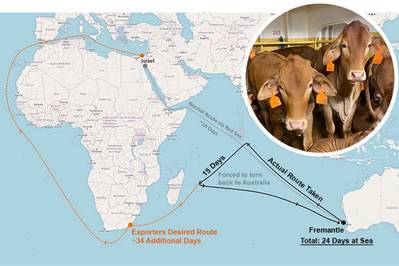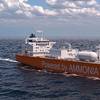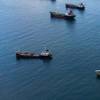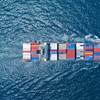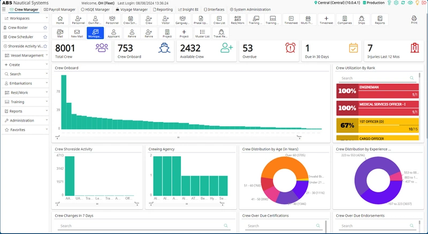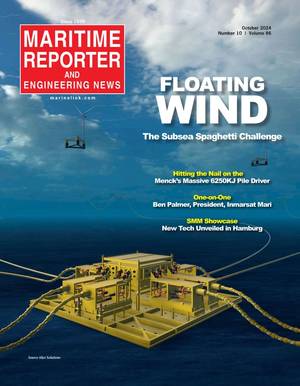Australian Welfare Organizations Call for Suspension of Live Animal Exports
The Australian Alliance for Animals has written an open letter to animal exporters imploring them to voluntarily suspend all live animal exports to or through the Red Sea while the risk of attack remains and to suspend any extended journeys to the Middle East via the Cape of Good Hope.
The move follows the recently aborted voyage of the Bahijah. The livestock carrier sailed from Australia for Israel on January 5 but was recalled over a week into the voyage after diverting towards South Africa rather than sailing through the Red Sea.
The Australian Department of Agriculture subsequently rejected a request by the exporter to send the ship which is carrying around 14,000 sheep and hundreds of cattle on a month-long voyage around Africa to Israel, but it has given the exporter the option of submitting another re-export plan.
Another livestock carrier, Jawan, has since left Australia for the Middle East.
The open letter says: “We have grave concerns for the welfare of animals subjected to live export, and especially those travelling to and through the Red Sea region. Reports of escalating violence in the region and targeted attacks on vessels transiting through the area highlight the significant risk to all vessels, including live export ships, their crew and live animal cargo. The current situation involving the MV Bahijah is a concerning example of this, having departed for Israel and doubling-back to Australia due to the risk of attack - a futile 30+ day voyage which could have been avoided. Under no circumstances should these animals, who have already endured so much, be forced to face another export journey.”
Many shipping companies have already suspended marine traffic to and through the Red Sea.
In Australia, the Department of Agriculture paused the deployment of observers on livestock vessels to all countries in the Middle East region on October 9, 2023 due to the uncertain security conditions. However, crews and animals continue to be exposed to the risks.
“Sending live export vessels via alternative routes, such as around the Cape of Good Hope, and then sending animals on prolonged road journeys is also unacceptable,” states the letter. “These alternatives extend the journey length, and significantly increase risks to the health and welfare of the animals on board. Animal welfare science shows that long transport journeys result in extremely poor animal welfare outcomes; the longer the journey, the greater the risk of suffering.
“Continuing to export under these circumstances is indefensible. There is no credible argument that live animals are needed in the region for food security (or other reasons) at this time. The escalating risks greatly outweigh any argument for these journeys to continue. We urge exporters to put the welfare and safety of those aboard live export vessels ahead of commercial interests and immediately suspend all voyages both, to or through the Red Sea, and via the Cape of Good Hope, until the escalating conflict and risk of attack subsides, and the situation can be re-assessed.”
The letter is signed by:
Glenys Oogjes Chief Executive Officer, Animals Australia.
Dr Bidda Jones AM Co-Director, Australian Alliance for Animals.
Rebecca Linigen National Director, FOUR PAWS Australia.
Erica Martin Chief Executive Officer, Humane Society International Australia.
Todd Westwood Chief Executive Officer, NZ SPCA.
Richard Mussell Chief Executive Office, RSPCA Australia.
Rosemary Elliot President, Sentient.
Rebecca Tapp Communications and Events Manager, Stop Live Exports.
Sue Foster Spokesperson, Vets Against Live Export.
Dr Helen Beattie Managing Director, Veterinarians for Animal Welfare Aotearoa.
Ondine Sherman Managing Director and Co-Founder, Voiceless.
Ben Pearson Country Director, World Animal Protection Australia and New Zealand.



